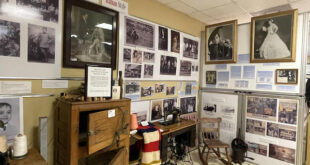As the director of the Chicago office of the Istituto Italiano di Cultura, Luca Di Vito’s job is to illuminate Italy’s vast cultural treasures and burnish the country’s image around the world.
In a sleek office on Chicago’s Michigan Avenue, the Italian government offers up a wealth of cultural riches in the form of movie screenings, lectures on art and architecture, discussions on Dante, and more.
Luca Di Vito, director of the Chicago office of the Istituto Italiano di Cultura, explains that Italy provides this resource to promote Italian culture around the world.
The Istituto has a devoted local fan base, but Italian Americans and Italophiles who are just discovering it may feel like they’ve stumbled on a treasure trove of cultural offerings. Even better, most are available to the public for free or just a modest fee.
Di Vito, 47, grew up in his mother’s hometown of Gorizia, then moved to Trieste and Rome. His parents are retired, his mother having worked as a teacher, and his father, originally from Salerno, having served as an officer in the Ministry of Education. Di Vito started his career as an attorney in Italy, hoping to contribute to the social good, but discovered that his passions aligned more with the arts and humanities. He joined the Istituto and has represented it in Asia, the Middle East and Europe.
He arrived in Chicago in January 2020 just before the pandemic struck. He quickly pivoted to online offerings and has since live-streamed Italian films. He is planning more events, including animated films and puppet theater for children, starting in September.
Fra Noi: Being director of the Istituto seems like a dream job. You’re working with films, art and culture, and traveling the world. Is it as much fun as it seems?
Luca Di Vito: I consider it to be a gift, a blessing, especially for the people I’ve met and the experiences I’ve had. It’s a beautiful job — creative and challenging. Every time I come to a different country, I need to understand the perception of Italy in that country. It’s important to give people what they’re expecting but also to present what people are not expecting to see from Italy. I find it stimulating to cooperate with local cultural institutions. I can create a dialogue with the society I’m working with.
Fra Noi: Why does the Italian government fund and offer the Istituto Italiano di Cultura? Considering it must represent a big financial commitment, what is the Italian government’s goal?
Di Vito: This is the reason why the Italian Cultural Institutes are part of the Ministry of Foreign Affairs and not the Ministry of Culture — that we belong together with embassies, consulates, the Italian Trade Agency, to represent the image of Italy to the world. Cultural institutes are a means to create soft power and influence, to create a positive image of the country. Italy is recognized as a cultural superpower because we have the highest number of UNESCO sites and a long history and tradition in architecture, music, visual arts and painting. So it’s a way to create good relationships with the rest of the world and share these treasures that we have.
Fra Noi: You were posted in Seoul, Korea, from 2007-13. What was your experience like there? Are Koreans familiar with Italian film and art?
Di Vito: It was an enriching experience, probably because it was the first time I confronted myself with such a radically different culture. But the effort I put in was rewarded with friendships that are still lasting. In Korea, Italy is known for specific areas of art. The first one I’d mention is opera, then fashion and design, and then food and wine. There’s a big passion for cinema, but what they know about Italy is that it’s famous for neorealism — Rossellini, De Sica — so it was interesting to bring them contemporary Italian cinema. To surprise people, in a way. And to bring things like Italian jazz music. You could see how people were discovering something new.
Fra Noi: You finished an assignment in Abu Dhabi in November 2019. What was it like there?
Di Vito: I was there for a very short time compared to our usual posting because my task was to open and start from scratch the Italian Cultural Institute there. I had never been to the Gulf area before, so I jumped at the opportunity. I had to rent the building, hire the people and decide what kind of institute it should be. It was not easy, but it’s now working very well.
I would say I discovered an open and tolerant society. When I was there in 2019, Pope Francis visited the United Arab Emirates, the first time in an Arab country, and held a public Mass in the stadium. In fact, there’s an area of Abu Dhabi where you have churches, and people are allowed to worship and follow their religion.
Fra Noi: You arrived in Chicago in January 2020, just before the pandemic hit Italy and then the United States. How did COVID-19 affect your mission?
Di Vito: When I arrive in a country, I like to take it slow, get a perception of the place. I talked to my predecessor in Chicago, Alberta Lai, who did an excellent job here. But I wanted to be here to grasp what the people were like.
The first month I was here, I was overwhelmed by the vibrance and dynamism of Chicago. People were very open to discussing new projects, which is something I have never found anywhere else, so I was really enthusiastic about being here. Then the pandemic changed everything radically.
We started cancelling events, and we transferred language classes online. I’ve been touched that in such a difficult moment, people kept following our activities. It’s a testimony to the passion people feel for Italian arts.
Fra Noi: You have, however, aired movies and virtual events.
Di Vito: We launched this online platform that allows people to see Italian films that are not easy to see in the U.S. One of my interests is to offer works for children. For September, I commissioned a series of short puppet theater shows from Teatro Verde. We will probably release one a week and put them on Vimeo.
We have just launched a membership opportunity, which gives access to a digital library, which is part of a network of 6,000 Italian libraries. So if you become a member for $30, you can download two e-books a month and read Italian newspapers and magazines. You also get a tote bag.
Fra Noi: Do you have a favorite art form?
Di Vito: I would say film is the art that talks to me the most. And I think cinema is the art of our time. It’s like paintings in the Renaissance or Middle Ages, when people would enter a church and see frescoes. Many people were illiterate, so those frescoes were a means of communicating with them. Now we need a tour guide to tell us what those frescoes represent because we don’t have that cultural language. But movies speak to everyone.
The Istituto Italiano di Cultura is located at 500 N. Michigan Ave., Ste. 1450, Chicago. For details, call 312-822-9545, email iicchicago@esteri.it or visit iicchicago.esteri.it.
The above appears in the July 2021 issue of the print version of Fra Noi. Our gorgeous, monthly magazine contains a veritable feast of news and views, profiles and features, entertainment and culture. To subscribe, click here.
 Fra Noi Embrace Your Inner Italian
Fra Noi Embrace Your Inner Italian







